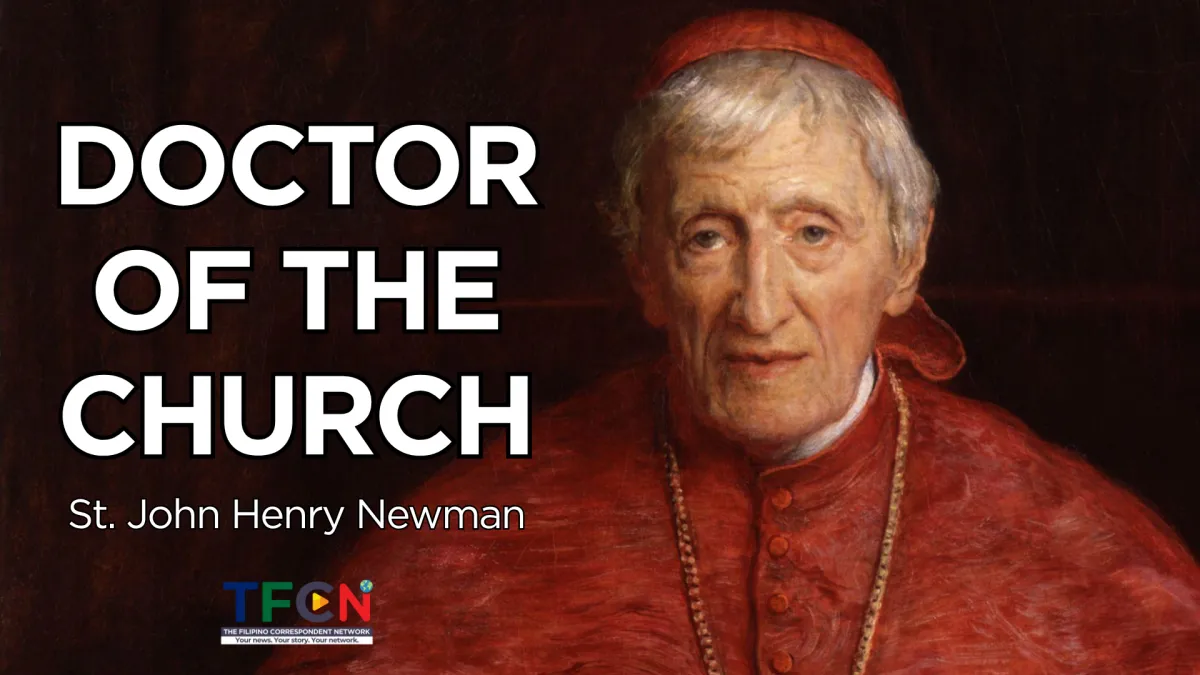
Saint John Henry Newman Declared 38th Doctor Of The Church
VATICAN City—In a historic moment for the Catholic Church, Saint John Henry Newman was today formally declared a Doctor of the Church by His Holiness Pope Leo XIV, bestowing the distinguished title on the 19th-century English theologian. The proclamation, which makes Newman the 38th Doctor, took place on the Solemnity of All Saints, 01 November 2025, a fitting occasion to honor one of the Church's greatest intellectual and spiritual lights.
The Holy Father’s decree recognizes the immense and enduring impact of Newman's writings on Catholic thought, especially his contributions to the understanding of the development of Christian doctrine, the role of conscience, and the integration of faith and reason.

The Holy Mass at St. Peter's Square in the Vatican on the Solemnity of All Saints, 01 Nov. 2025, where Saint John Henry Newman was declared by Pope Leo XIV as the 38th Doctor of the Church./Vatican News

The declaration by Pope Leo XIV: "We, having obtained the opinions of numerous Brothers in the Episcopate and of many of Christ's Faithful throughout the world, having consulted the Dicastery for the Causes of Saints, after mature deliberation and with certain knowledge, and by fullness of the apostolic power, declare Saint John Henry Newman Doctor of the Universal Church. In the name of the Father and of the Son and of the Holy Spirit. Amen."/Vatican News
A Life's Quest for Truth
John Henry Newman's life (1801–1890) was a profound and relentless journey in pursuit of religious truth.
Born in London, he was a brilliant student who rose to prominence at Oxford University, serving as a fellow at Oriel College and as Vicar of the University Church, St. Mary the Virgin. During his Anglican years, he became a central figure in the Oxford Movement, advocating for the revival of traditional Catholic elements within the Church of England, emphasizing its connection to the early Church Fathers.
His intensive historical and theological research, however, led him to the difficult conclusion that the fullness of the Christian Church was found in Roman Catholicism. In 1845, he made the momentous decision to be received into the Catholic Church, a conversion that caused scandal and led to him being ostracized by many of his former friends and colleagues.

A portrait of Saint John Henry Newman hangs at St. Peter's Basilica during the liturgical celebration./Vatican News
Ordained a Catholic priest two years later, he founded the first Oratory of St. Philip Neri in England (in Birmingham), where he devoted the rest of his life to preaching, writing, and education. His prolific works, including his spiritual autobiography, Apologia Pro Vita Sua, and An Essay on the Development of Christian Doctrine, continue to shape contemporary theology. In a rare honor for a convert, Pope Leo XIII created him a cardinal in 1879, with the motto: "Cor ad cor loquitur" ("Heart speaks to heart"). He was canonized by Pope Francis in 2019.

The national shrine of Saint John Henry Newman, where the great cardinal lived, wrote, and established the first English house of the Oratory of St. Philip Neri.(Birmingham Oratory Facebook)
Criteria for a Doctor of the Church
The title of Doctor of the Church (Doctor Ecclesiae) is an honorific reserved for saints whose body of work—their writings, teaching, and preaching—have made a uniquely eminent contribution to the Catholic Church's theology and moral life. This distinction is conferred by the Pope or an ecumenical council.
There are traditionally three essential requirements for a saint to be considered for this title:
Eminens Doctrina (Eminent Learning): The saint must possess exceptional theological knowledge and express profound insights that significantly illuminate and advance the Church's understanding of the faith.
Insignis Vitae Sanctitas (A High Degree of Holiness of Life): The saint must have lived a life of heroic virtue, a prerequisite demonstrated by their prior canonization (being declared a saint).
Ecclesiae Declaratio (Proclamation by the Church): The declaration must be officially pronounced by the Church, usually by a formal decree from the Supreme Pontiff.
Newman joins this exclusive group due to his unparalleled ability to address the intellectual challenges of the modern age, a contribution praised by Pope Leo XIV for giving "a decisive contribution to the renewal of theology."
The Pope and the Context
The proclamation of Saint John Henry Newman as the 38th Doctor of the Church was made by Pope Leo XIV (born Robert Francis Prevost), who was elected as the head of the Catholic Church in the 2025 papal conclave, following the death of Pope Francis. Pope Leo XIV, the first U.S.-born pontiff, explicitly linked the declaration to the ongoing Jubilee of the World of Education, underscoring Newman’s dedication to Christian education and the interplay of faith and intellectual rigor.

